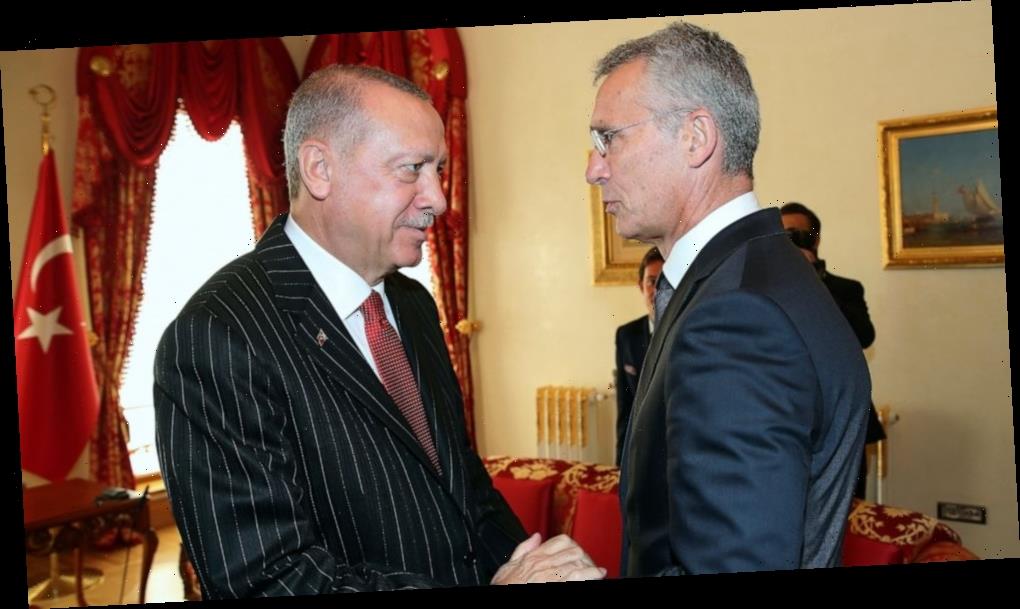Turkey’s invasion of northern Syria — along with the criticism and threats of sanctions brandished by fellow NATO members at Ankara over the offensive — is close to sparking a crisis at the world’s biggest military alliance.
But despite the high political-military tensions, Turkey is very unlikely to be ejected from the 29-member alliance, for NATO has seen tense times and survived them before.
From the Suez Canal crisis in 1956 to France leaving its military command structure in 1967 — which forced the alliance to move its headquarters to Brussels in Belgium — to the deep split among allies over the Iraq war in 2003, NATO bonds have been tested. But no country has left the alliance or been forced out.
Beyond that, Turkey is of great strategic importance to NATO. The large, mainly Muslim country straddles the Bosporus Strait, making it vital bridge between Europe, the Middle East and Central Asia. It’s also the only waterway in and out of the Black Sea, where Russia’s naval fleet is based.
Turkey has NATO’s second biggest army, after the United States, and keeping the country inside NATO helps keep a lid on Turkey’s historic tensions with its neighbor Greece.
NATO allies also rely on the Incirlik air base in southeast Turkey as a staging point for access to the Middle East. The alliance runs aerial surveillance operations from Incirlik and the United States has nuclear weapons stationed there.
“I think it’s better to have Turkey inside NATO than outside NATO, to be honest. I think it’s important to have them in our family and discussion. I think it’s easier to work with them that way, but we cannot behave as if this had not happened,” Norwegian Prime Minister Erna Solberg said Tuesday.
Turkey has been testing fellow NATO members’ patience for a while.
Its military offensive in Syria comes on top of tensions over Turkey’s purchase of Russian-made S400 missiles, which threaten NATO security and the F-35 stealth jet. Turkish President Recep Tayyip Erdogan also purged thousands of military officers following the failed coup in Turkey in 2016 and some have sought, and been granted, asylum in NATO countries.
“At the moment, this is the greatest political-military challenge the alliance faces,” Ian O. Lesser, vice president at the German Marshall Fund think-tank, said Wednesday. “Obviously as an existential matter, it’s not on a par with deterring Russia in places like the Baltics or around the Black Sea. But in terms of a political crisis within the alliance, and potentially a security crisis, it’s very, very high on the agenda.”
So far, NATO Secretary-General Jens Stoltenberg has urged Turkey to show restraint and to be wary of provoking yet another humanitarian disaster, particularly as well over a million Syrians have already fled to Europe in recent years.
Stoltenberg has exhorted Ankara to focus on NATO’s common enemy; the Islamic State group, some of whose fighters are reported to have escaped jail during the Turkish offensive. But he has not, at least not in public, called for a ceasefire.
Indeed, Stoltenberg has shied away from any public criticism of Turkey — or of any other NATO member — and recalled that the alliance plays no role in Syria, beyond helping with the surveillance of air traffic over the country from abroad.
One option open to Turkey’s partners is to request consultations through Article 4 of NATO’s founding treaty, which is possible when “in the opinion of any of them, the territorial integrity, political independence or security of any of the Parties is threatened.”
Turkey has done this in the past, in 2015 after a series of extremist attacks on its territory and in 2012 when a fighter jet was shot down over Syria. Poland did so in 2014, when tensions in Ukraine were at their height.
So far, no country has officially requested such consultations, but some European allies have called for a ministerial-level meeting of the international coalition fighting IS. NATO defense ministers meet in Brussels next week and are certain to discuss the Turkish invasion.
Some countries will also seek clarification at that Oct.24-25 meeting from the United States about what exactly its plans are in Syria, after Turkey took the departure of U.S. troops from there as a green-light to launch its offensive.
But whatever happens, the chances of Turkey being evicted from NATO are slim. Lesser said, as far as he understands, “there is no mechanism to remove a member.”
That doesn’t mean relations can’t break down.
“There are ways in which a membership can become dysfunctional, either because there’s no political consensus around the member’s concerns,” he said, or if Turkey’s frustration grew to a point where it would “consider options like withdrawing from the military command structure.”
———
AP Writer Geir Moulson in Berlin contributed to this report.
———
Follow AP’s full coverage of the war in Syria and the Turkish invasion at https://www.apnews.com/Syria
Source: Read Full Article
